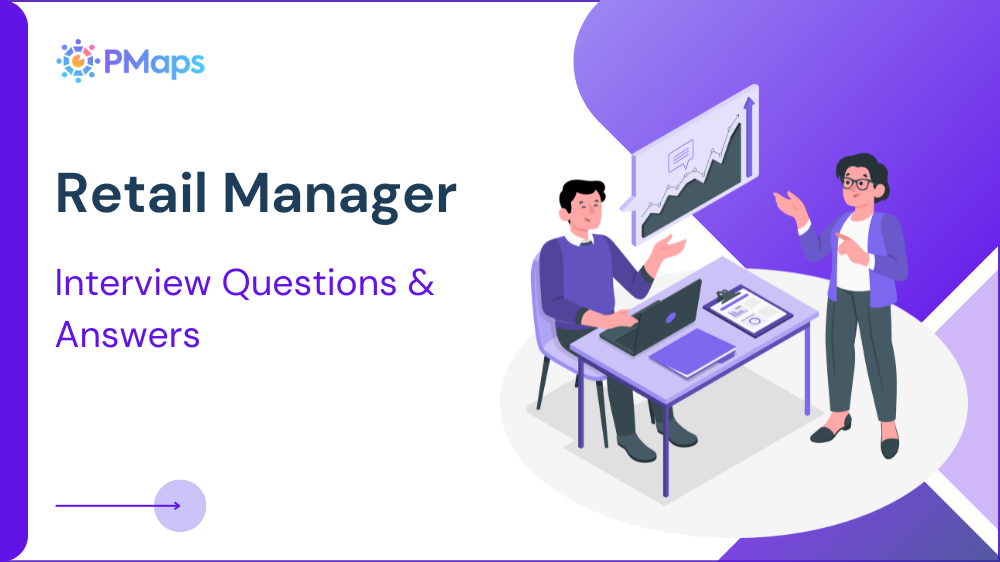
Retail Managers are the cornerstone of a store’s day-to-day operations. They are responsible for managing teams, optimizing sales, and ensuring a smooth customer experience. Their ability to handle both the practical aspects of store management and the challenges of customer expectations is what ultimately drives a store’s success.
Don’t guess leadership—validate with the Retail Manager Assessment.

As the retail industry evolves, hiring managers who can adapt to new trends and effectively lead teams becomes even more important. This guide presents 25 carefully selected retail manager interview questions to help you assess candidates' leadership abilities, operational expertise, and capacity to contribute to your store’s growth.Let’s take a closer look at the questions that will help you identify the best candidates for the role.
Double-check retail KPIs in the Retail Manager Job Description.
General Interview Questions for Retail Managers
General interview questions help gauge a candidate’s understanding of the fundamental responsibilities of a Retail Manager, their approach to leadership, and how they manage day-to-day operations. These questions provide a solid foundation for assessing fit and capability.
1. What motivated you to pursue a career in retail management?
What it Assesses:
This question helps gauge the candidate's passion for the role and their long-term commitment to the retail industry
What to Listen For:
Look for candidates who express a genuine interest in working with people, managing teams, and driving business success. They should explain what excites them about the dynamic nature of retail.
Sample Ideal Answer:
“I’ve always enjoyed the fast-paced nature of retail and the challenge of managing diverse teams. The opportunity to improve operational efficiency and create memorable customer experiences is what keeps me motivated in this industry.”
2. How do you prioritize your daily tasks in a busy retail environment?
What it Assesses:
Time management, organizational skills, and ability to handle competing priorities.
What to Listen For:
Candidates should describe how they balance operational tasks like staff scheduling and inventory management with customer service and sales goals. The ability to prioritize based on store needs and business objectives is key.
Sample Ideal Answer:
“I start each day by reviewing sales targets and staffing needs. I assess which areas of the store require the most attention, whether it’s restocking shelves or resolving customer complaints, and then allocate my time accordingly to ensure smooth operations.”
3. Can you describe a time when you had to handle a difficult customer situation?
What it Assesses:
Conflict resolution, customer service, and interpersonal communication skills.
What to Listen For:
The candidate should demonstrate patience, empathy, and problem-solving skills. They should explain how they diffused the situation and what steps they took to ensure customer satisfaction.
Sample Ideal Answer:
“A customer was unhappy with a product and wanted a full refund. I listened to their concerns, empathized with their frustration, and offered an exchange for a different item or a store credit. By staying calm and professional, we were able to resolve the issue without escalation.”
4. How do you motivate your team to achieve sales goals?
What it Assesses:
Leadership style, team management, and ability to drive performance.
What to Listen For:
Look for candidates who focus on setting clear goals, providing incentives, and offering continuous feedback. They should emphasize team collaboration and their ability to inspire staff to meet targets.
Sample Ideal Answer:
“I set clear, achievable sales targets and regularly check in with my team to monitor progress. I also recognize top performers and provide incentives like bonuses or public recognition to keep morale high and encourage everyone to reach their potential.”
5. What strategies do you use to ensure excellent customer service?
What it Assesses:
Customer service approach and ability to create a positive shopping experience.
What to Listen For:
Candidates should mention training programs for staff, setting customer service standards, and actively seeking customer feedback. Their response should demonstrate a proactive approach to maintaining high service levels.
Sample Ideal Answer:
“I focus on creating a customer-first culture within my team. This includes training staff to handle customer inquiries promptly and effectively, encouraging them to go the extra mile, and regularly gathering feedback to improve our service quality.”
Behavioral Interview Questions for Retail Managers
Behavioral questions are key to understanding how candidates have dealt with past situations and challenges in their previous roles. These questions help interviewers assess problem-solving, leadership, and their ability to adapt to dynamic retail environments.
1. Tell me about a time when you had to address underperformance in your team. How did you handle it?
What it Assesses:
Leadership skills, problem-solving, and conflict management.
What to Listen For:
Look for candidates who demonstrate a structured approach to handling performance issues. They should mention specific steps such as offering constructive feedback, setting clear expectations, and providing support or training to help the team member improve.
Sample Ideal Answer:
“When I noticed a team member was struggling to meet sales targets, I scheduled a one-on-one meeting to discuss their challenges. We identified areas for improvement, and I provided additional training and coaching. Over time, their performance improved, and they started hitting their targets consistently.”
2. Describe a situation where you had to implement a new store policy or procedure. How did you ensure it was followed?
What it Assesses:
Change management, communication, and implementation skills.
What to Listen For:
Candidates should explain how they communicated the new policy to their team, addressed any resistance, and ensured everyone was aligned. Look for mention of follow-ups and tracking compliance.
Sample Ideal Answer:
“We recently implemented a new returns policy. I held a staff meeting to explain the reasons behind the change and outlined the procedure. I also created a reference guide for the team and did follow-up training to ensure everyone understood and followed the new policy.”
3. Tell me about a time when you had to manage multiple priorities during a busy period. How did you stay organized?
What it Assesses:
Time management, organization, and decision-making under pressure.
What to Listen For:
Look for a clear method of prioritizing tasks. The candidate should mention how they assess urgency, allocate resources, and ensure that customer service and operational needs are met despite the pressures.
Sample Ideal Answer:
"During peak season, I used a task management system to keep track of priorities. I delegated less urgent tasks to my team, ensuring they knew exactly what needed to be done. I kept checking in to ensure critical areas like customer service and inventory were handled first."
4. Can you give an example of a time when you turned around a dissatisfied customer’s experience?
What it Assesses:
Customer service, problem resolution, and emotional intelligence.
What to Listen For:
Candidates should demonstrate empathy, problem-solving skills, and the ability to de-escalate tense situations. They should also mention any long-term strategies they put in place to prevent similar issues in the future.
Sample Ideal Answer:
"A customer was unhappy about a damaged product. I immediately apologized and offered an exchange or refund. I personally ensured they received the new product, and I followed up to confirm satisfaction. I also reviewed our inventory process to minimize similar complaints."
5. Describe a time when you had to motivate your team during a particularly slow sales period. How did you approach it?
What it Assesses:
Motivational skills, leadership, and team morale management.
What to Listen For:
Look for candidates who can keep their team engaged during downturns. They should mention strategies such as setting mini-goals, offering incentives, or fostering a positive work environment despite challenges.
Sample Ideal Answer:
“During a slow period, I introduced daily sales goals for the team with small rewards for meeting them. I also made sure to highlight any positive customer feedback, which boosted morale. We ended the period on a high note, and it helped the team stay focused.”
Situational Interview Questions for Retail Managers
Situational questions simulate real-life scenarios that Retail Managers often encounter. These questions help interviewers assess a candidate’s ability to think critically, make decisions on the spot, and handle unexpected situations effectively.
1. If you were faced with a stock shortage of a high-demand product, how would you handle it?
What it Assesses:
Problem-solving, inventory management, and customer service.
What to Listen For:
Candidates should show how they would communicate the issue to customers while looking for solutions, such as offering alternatives or backordering the product. They should also mention working with inventory or suppliers to avoid future shortages.
Sample Ideal Answer:
"I would immediately communicate with customers about the stock shortage, offering alternatives or suggesting a pre-order option. I’d work with the suppliers to expedite the delivery, and I’d implement a better inventory tracking system to prevent future shortages."
2. How would you handle a situation where two team members have a disagreement affecting their work?
What it Assesses:
Conflict resolution, team dynamics, and leadership.
What to Listen For:
Candidates should explain how they would mediate the situation by addressing the concerns of both team members, fostering open communication, and finding a solution that benefits the team as a whole. Look for evidence of empathy and diplomacy.
Sample Ideal Answer:
"I’d speak with both team members individually to understand their perspectives, then bring them together to resolve the issue. I’d ensure that they understand the importance of working together, and I’d offer support in finding a compromise that aligns with store goals."
3. If you were asked to implement a new sales strategy during a busy holiday season, how would you manage it without affecting store performance?
What it Assesses:
Adaptability, planning, and ability to manage change under pressure.
What to Listen For:
Candidates should outline a plan that includes clear steps for integrating the new strategy, such as briefing the team, allocating resources, and monitoring progress. They should demonstrate an understanding of balancing innovation with the need to maintain operations.
Sample Ideal Answer:
"I would break the new strategy into smaller, manageable steps. I’d ensure the team is briefed and well-prepared for the change, using clear communication to make sure it doesn’t interfere with holiday performance. I’d monitor progress closely and adjust where necessary to keep the store running smoothly."
4. Imagine you’re managing a store with a high turnover rate. How would you approach reducing employee turnover and improving retention?
What it Assesses:
Employee management, retention strategies, and team-building.
What to Listen For:
Candidates should discuss strategies like improving employee engagement, offering incentives, providing growth opportunities, and creating a positive work environment. They should emphasize listening to employee feedback and addressing concerns proactively.
Sample Ideal Answer:
"I’d start by gathering feedback from the team to understand why employees are leaving. I’d focus on improving employee engagement, offering more growth opportunities, and creating a more supportive work culture. Offering incentives for long-term commitment and creating a clear path for advancement would also help."
5. If a key performance indicator (KPI) for the store isn’t being met, how would you analyze and address the situation?
What it Assesses:
Analytical thinking, problem identification, and decision-making.
What to Listen For:
Look for a structured approach where the candidate identifies the root cause of the problem, analyzes available data (sales, foot traffic, employee performance), and takes corrective actions. They should discuss adjusting strategies and improving performance.
Sample Ideal Answer:
"I would first analyze the sales data to identify patterns or issues, such as low foot traffic or product availability. I’d also check on staff performance to see if there are any gaps in customer service. After identifying the root cause, I’d adjust staffing levels, implement new promotional activities, or fine-tune the sales strategy to meet the target."
Technical or Functional Interview Questions for Retail Managers
Technical questions help interviewers evaluate a candidate’s hands-on experience with key retail management tools, operational processes, and their understanding of the logistics behind day-to-day store operations. These questions ensure that the candidate is equipped to handle the technical demands of the role.
1. What systems or software have you used for inventory management, and how do you ensure accurate stock levels?
What it Assesses:
Proficiency with inventory management systems and attention to detail.
What to Listen For:
Candidates should mention any experience with inventory management tools (e.g., SAP, Oracle, or retail-specific software). They should explain how they track stock levels, identify discrepancies, and implement processes to maintain accurate records.
Sample Ideal Answer:
"I’ve used systems like SAP and Oracle for inventory management. I ensure accurate stock levels by regularly conducting stock audits, setting up automatic reorder alerts, and monitoring sales trends. I also train staff to report discrepancies immediately, ensuring quick resolution."
2. How do you use sales data to improve store performance?
What it Assesses:
Analytical skills, data-driven decision-making.
What to Listen For:
Look for candidates who can explain how they analyze sales data to identify trends, spot underperforming areas, and implement improvements. They should discuss adjusting staffing, promotions, or product offerings based on insights gathered from data.
Sample Ideal Answer:
"I regularly analyze sales data to identify high-performing products and low-performing periods. If certain products are underperforming, I adjust our marketing efforts or discounts. I also use sales data to optimize staffing during peak hours, ensuring we have the right resources to meet customer demand."
3. Can you explain how you handle employee scheduling and ensure optimal staff coverage?
What it Assesses:
Staffing management and operational efficiency.
What to Listen For:
Candidates should explain how they balance staffing levels based on store traffic, sales trends, and employee availability. They should mention using scheduling software or manual methods and ensuring there’s always adequate coverage without overstaffing.
Sample Ideal Answer:
"I use scheduling software to analyze foot traffic patterns and predict peak hours. I then schedule staff accordingly, ensuring there are enough employees during busy times and fewer during slower periods. I also ensure I’ve got backup coverage in case of last-minute absences."
4. What approach do you take to ensure your team provides excellent customer service consistently?
What it Assesses:
Customer service management and team leadership.
What to Listen For:
Candidates should highlight training programs, service standards, and performance reviews. They should also mention how they lead by example and foster a customer-first culture within the team.
Sample Ideal Answer:
"I ensure excellent customer service by training my team regularly on product knowledge, customer service skills, and handling difficult situations. I set clear expectations for service standards and provide real-time feedback. I also lead by example, engaging with customers and demonstrating the level of service I expect."
5. How do you manage store budgets and control costs while maintaining quality?
What it Assesses:
Budget management, cost control, and financial oversight.
What to Listen For:
Look for candidates who understand the importance of balancing quality with cost management. They should discuss tracking expenses, setting budget limits, and finding ways to optimize store operations without sacrificing quality or customer experience.
Sample Ideal Answer:
"I monitor daily sales and expenses closely, ensuring we stay within budget without compromising quality. I review supplier contracts for cost efficiency and implement cost-cutting measures like reducing waste or optimizing stock levels. However, I always ensure these changes don’t negatively affect the customer experience or product quality."
Pro Tips for Interviewing Retail Managers
To hire an effective Retail Manager, it’s essential to go beyond standard interview questions. These pro tips will help you assess the skills that matter most, from team leadership and sales optimization to customer service and financial management.
1. Ask candidates about their approach to handling both staff motivation and accountability
Retail managers need to balance team engagement with achieving results. Ask how they ensure their team remains motivated while maintaining accountability. Candidates should demonstrate their ability to lead by example and provide constructive feedback.
2. Test their decision-making process with a real-world scenario
Present a scenario like handling a staff conflict or managing an underperforming product line. This allows you to see how they make decisions on the spot, manage resources, and prioritize business goals under pressure.
3. Inquire about their experience with performance metrics and KPIs
Retail managers should have a solid understanding of performance metrics such as sales conversion rates, customer satisfaction scores, and inventory turnover. Ask candidates how they track these metrics and use them to drive store performance.
4. Evaluate their customer-first mindset
Customer satisfaction is central to retail success. Ask candidates to describe how they’ve handled difficult customer situations in the past. Look for answers that demonstrate empathy, quick thinking, and a solution-oriented approach.
5. Ask about their experience with budget management
Effective cost control is a critical aspect of retail management. Ask candidates how they’ve managed budgets in previous roles, how they track expenses, and the strategies they use to balance cost-cutting with maintaining quality.
Conclusion
Hiring a Retail Manager is about finding someone who not only understands the logistics of store operations but can also lead, inspire, and drive results in a constantly changing environment. By focusing on the key areas of leadership, operational efficiency, customer service, and financial management, you can ensure that you hire a candidate who will bring value to your store and your team.
Ready to assess your next Retail Manager? Take a free trial and demo today to streamline your hiring process and ensure your candidate can deliver the results you expect.









